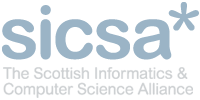SICSA and EIT Digital partner to deliver Scottish Funding Council Saltire Scheme
Scotland & Brussels, March 2nd, 2022:
The Scottish Informatics and Computer Science Alliance (SICSA) have partnered with EIT Digital to deliver on a £75k SFC investment in renewing and strengthening Scottish – European research collaborations.
The “Saltire Emerging Researcher Scheme” is part of a £6.75m Programme funded by the Scottish Government to support international and EU activity and collaboration including boosting support for international research collaboration and talent attraction, increase scholarship offering to include EU students and support the effective use of alumni globally.
SICSA, in partnership with EIT Digital, has been awarded funding within the Saltire Scheme to reinforce and build new research partnerships while developing individual researchers’ networks with European partners across the Computer Science discipline. The scheme will fully fund incoming and outgoing exchanges of up to six months to both enhance the training experience for PhD Students and support Early Career Researchers in developing their networks and collaborations across Scotland and Europe. The partnership leverages the reach of EIT Digital’s extensive network across Europe in research intensive institutions and SICSA’s strong network of partnerships across Scottish Computing Science.
Professor Stuart Anderson, Director of SICSA said “Informatics and Computer Science researchers in SICSA do have strong and vibrant links with researchers across Europe. However, BREXIT has had a severe cooling effect on funding channels because of complex and protracted negotiations on funding. The Saltire awards give our PhD students and Early Career Researchers an immediate boost in reinforcing existing and building new collaborations. These will form the foundations of new long-term collaborative research across the EU.”
Jamie Hepburn, Minister for Higher and Further Education said: “I am delighted to see funding under the Saltire Emerging Research Scheme has enabled this partnership between SICSA and EIT Digital. This partnership has increased the reach and opportunities for exchange and collaboration for both Scottish and European researchers, to help them deliver a better digital future.”
Morgan Gillis, EIT Digital’s UK director, commented that: “EIT Digital is very pleased with the take-up of its programs in Scotland and delighted to be deeply involved in the international development of Scotland’s digital economy across a range of sectors. We much appreciate our close collaboration with Scottish Enterprise and the Scottish Funding Council as strategic partners in making this success possible.”
Stuart Fancey, Director of Research and Innovation at the Scottish Funding Council, said: “Forging strong international links is a crucial part of maintaining and enhancing Scotland’s world-class reputation for research and innovation. The Saltire Emerging Researcher Scheme is therefore an incredibly important investment in the future. The partnership between SICSA and EIT Digital demonstrates the energy and commitment that will make the scheme a success for everyone involved. I am sure all those taking part in the SICSA/EIT Digital exchanges will benefit considerably from the experience.”
EIT Digital in Scotland is funded by our partners Scottish Enterprise and the Scottish Funding Council. We are also supported by Highlands & Islands Enterprise, FinTech Scotland, Edinburgh Innovations and University of Edinburgh.
Press notes
EIT Digital’s Satellite Office, opened in Edinburgh in April 2019 by Minister for Trade, Investment and Innovation Ivan McKee, has maintained strong progress within its remit to deliver impact to Scotland’s national digital economy with €6m of new investment to commercialise innovative new digital products and the launch of three Scottish doctoral programs focussed on Fintech, Privacy and 5G/Future Wireless Communication – all domains of national strategic importance.
SICSA is a Research Pool, funded by the Scottish Funding Council and 14 partner Universities to promote collaboration in research, teaching and knowledge exchange across its partner Universities. It is part of Research and Innovation Scotland that brings together all of the Scottish Research Pools and Innovation Centres to cooperate on multi-disciplinary challenges.
Contact details for:
EIT Digital: martin.beaton@eitdigital.eu
https://www.eitdigital.eu/












